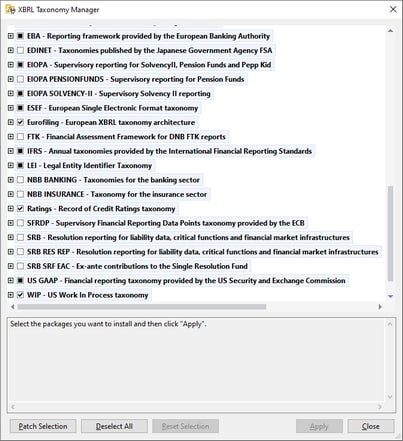Taxonomy Manager
XBRL Taxonomy Manager is an Altova tool that provides a centralized way to install and manage XBRL taxonomies for use across all Altova's XBRL-enabled applications, including MapForce.
•On Windows, Taxonomy Manager has a graphical user interface (screenshot below) and is also available at the command line. (Altova's desktop applications are available on Windows only; see list below.)
•On Linux and macOS, Taxonomy Manager is available at the command line only. (Altova's server applications are available on Windows, Linux, and macOS; see list below.)
Altova's XBRL-enabled applications
Desktop applications (Windows only) | Server applications (Windows, Linux, macOS) |
Altova XBRL Add-ins for Excel (EBA, ESEF, EIOPA, WIP) | MapForce Server (Standard and Advanced Editions) |
MapForce Enterprise Edition | RaptorXML+XBRL Server |
StyleVision Enterprise Edition | StyleVision Server |
XMLSpy Enterprise Edition |
Installation and de-installation of Taxonomy Manager
Taxonomy Manager is installed automatically when you first install a new version of Altova Mission Kit Enterprise Edition or of any of Altova's XBRL-enabled applications (see table above).
Likewise, it is removed automatically when you uninstall the last Altova XBRL-enabled application from your computer.
Taxonomy Manager features
Taxonomy Manager provides the following features:
•Shows XBRL taxonomies installed on your computer and checks whether new versions are available for download.
•Downloads newer versions of XBRL taxonomies independently of the Altova product release cycle. (Altova stores taxonomies online, and you can download them via Taxonomy Manager.)
•Install or uninstall any of the multiple versions of a given taxonomy (or all versions if necessary).
•An XBRL taxonomy may have dependencies on other taxonomies. When you install or uninstall a particular taxonomy, Taxonomy Manager informs you about dependent taxonomies and will automatically install or remove them as well.
•Taxonomy Manager uses the XML catalog mechanism to map schema references to local files. In the case of large XBRL taxonomies, processing will therefore be faster than if the taxonomies were at a remote location.
•All major taxonomies are available via Taxonomy Manager and are regularly updated for the latest versions. This provides you with a convenient single resource for managing all your taxonomies and making them readily available to all of Altova's XBRL-enabled applications.
•Changes made in Taxonomy Manager take effect for all Altova products installed on that machine.
Custom XBRL Taxonomies
If you need to work with custom XBRL taxonomies that are not included with Taxonomy Manager, you can add these taxonomies to the set of custom packages that MapForce can reference. Do this as follows:
•In Altova desktop applications: Select the Tools | Options menu command, and go to the XBRL | Taxonomy Packages section. Browse for the ZIP package of your custom XBRL taxonomy. For more information, see the description of this command in your desktop product documentation.
•In Altova server applications: When running commands from the command line that support custom taxonomies, provide the --taxonomy-package or --taxonomy-package-config-file option. For example: In RaptorXML+XBRL Server, these options are supported by XBRL validation commands such as valxbrl or valxbrltaxonomy; in MapForce, they are supported by run command.
How it works
Altova stores all XBRL taxonomies used in Altova products online. This repository is updated when new versions of the taxonomies are released. Taxonomy Manager displays information about the latest available taxonomies when invoked in both its GUI form as well as on the CLI. You can then install, upgrade or uninstall taxonomies via Taxonomy Manager.
Taxonomy Manager also installs taxonomies in one other way. At the Altova website (https://www.altova.com/taxonomy-manager) you can select a taxonomy and its dependent taxonomies that you want to install. The website will prepare a file of type .altova_taxonomies for download that contains information about your taxonomy selection. When you double-click this file or pass it to Taxonomy Manager via the CLI as an argument of the install command, Taxonomy Manager will install the taxonomies you selected.
Local cache: tracking your taxonomies
All information about installed taxonomies is tracked in a centralized cache directory on your computer, located here:
Windows | C:\ProgramData\Altova\pkgs\.cache |
Linux | /var/opt/Altova/pkgs\.cache |
macOS | /var/Altova/pkgs |
This cache directory is updated regularly with the latest status of taxonomies at Altova's online storage. These updates are carried out at the following times:
•Every time you start Taxonomy Manager.
•When you start MapForce for the first time on a given calendar day.
•If MapForce is open for more than 24 hours, the cache is updated every 24 hours.
•You can also update the cache by running the update command at the command line interface.
The cache therefore enables Taxonomy Manager to continuously track your installed taxonomies against the taxonomies available online at the Altova website.
Do not modify the cache manually!The local cache directory is maintained automatically based on the taxonomies you install and uninstall. It should not be altered or deleted manually. If you ever need to reset Taxonomy Manager to its original "pristine" state, then, on the command line interface (CLI): (i) run the reset command, and (ii) run the initialize command. (Alternatively, run the reset command with the --i option.) |
HTTP proxy
You can use an HTTP proxy for Taxonomy Manager connections. The proxy settings will be taken from the system's proxy settings and/or MapForce's local-network proxy settings (defined in the Options dialog (Tools | Options | Network Proxy)).
